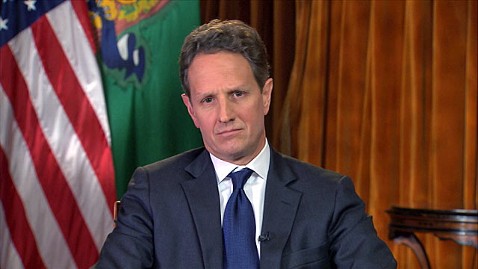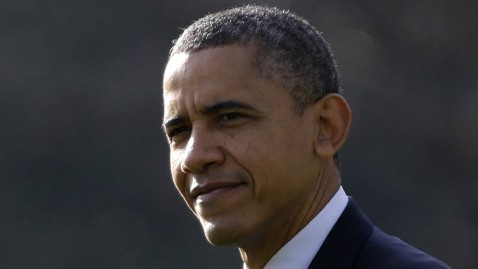Dec 2, 2012 9:00am

(ABC News)
With the fiscal cliff looming and no deal to resolve it in sight, Treasury Secretary Timothy Geithner expressed confidence that a compromise could be reached during my interview with him on “This Week,” but said the burden is now on Republicans to help find a solution to avoid a potential economic crisis.
(More from Sunday’s show HERE.)
“I actually think that we’re gonna get there. I mean, you know, just inevitably gonna be a little political theater in this context,” Geithner said, when asked whether Senate Minority Leader Mitch McConnell laughed after hearing President Obama’s plan to avert the fiscal cliff. ”Sometimes that’s a sign of progress. Think we’re actually making a little bit of progress, but we’re still some distance apart.”
Echoing widespread Republican rejection of the White House’s proposal last week, House Speaker John Boehner said after meeting with Geithner that ” the White House has to get serious.”
“And at this point though — you gotta recognize that they’re in a very difficult place. And they recognize they’re gonna have to move on a bunch of things. But they don’t know really how to do it yet. And how to get support from the — from the members on the Republican side,” he said, adding later that the proverbial ball was “absolutely” in the GOP court. “And, you know, when they come back to us and say, ‘We’d like you to consider this. And we’d like you to consider that,’ we’ll take a look at that.”
Geithner — who met with top GOP leaders this week to present the White House’s proposal to end the fiscal standoff — predicted support from “the business community” and “from the American people” for a deal approximating the one being offered, which reportedly includes tax hikes on the wealthy, cuts to Medicare and some stimulus spending.
However, if there is no agreement by the end of the year, the treasury secretary told me going over the cliff would be “very damaging.”
“Look, there’s a huge amount at stake here in this economy, George. And there’s just no reason why 98 percent of Americans have to see their taxes go up because some members of Congress on the Republican side want to block tax rate increases for 2 percent of the wealthiest Americans. Remember, those tax rates, those tax cuts, cost a trillion dollars over 10 years,” he said.
Geithner said the White House plan offered a “good mix” of increased taxes and spending cuts. He also added that Social Security reform would not be part of the discussion to resolve the fiscal cliff.
“We think we have a very good plan, a very good mix of tax reforms that raise a modest amount of revenue on the wealthiest 2 percent of Americans, combined with very comprehensive, very well designed, very detailed savings that get us back to the point where our debt is stable and sustainable,” he said. “We’re prepared to, in a separate process, look at how to strengthen Social Security. But not as part of a process to reduce the other deficits the country faces,” he said.
Finally, with Geithner wrapping up his time in the president’s cabinet, I asked him if banking executive Jamie Dimon – who has billionaire Warren Buffett’s endorsement — should be named the next treasury secretary, but Geithner declined to answer directly.
“George, the president’s gonna choose somebody very talented to lead the Treasury for his next four years. And– I’m very fortunate I’ve been able to work with him to help solve these problems in the country over this period of time. And I’m very confident he’s gonna have somebody in place– in January to succeed me,” he said.










